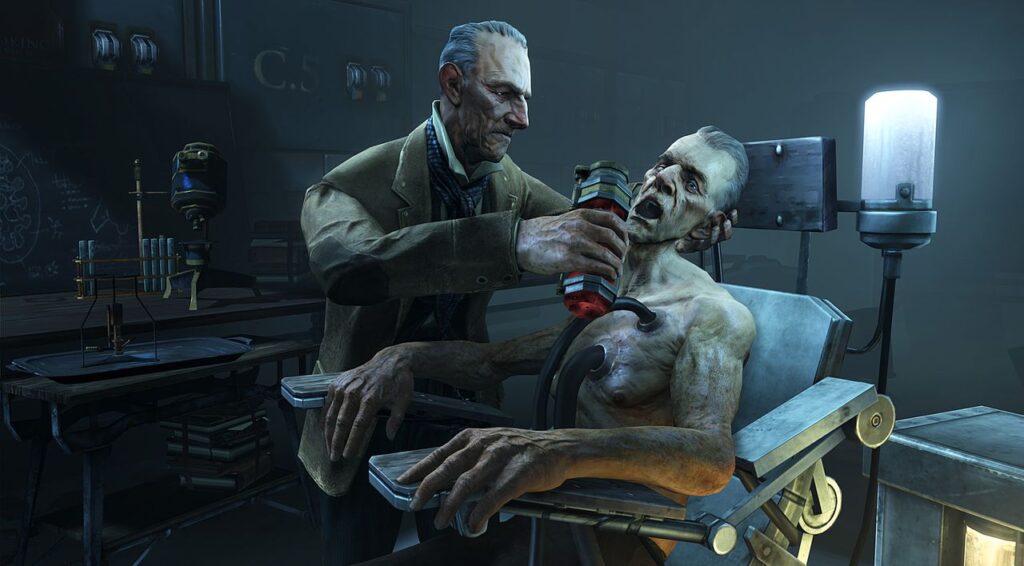
The development of the acclaimed video game Dishonored was significantly influenced by the musical Sweeney Todd, according to writer Austin Grossman. He revealed that when he first joined the team, the concept seemed chaotic, but it gradually evolved into one of the most celebrated immersive worlds in gaming. The backdrop of Dunwall, along with its unique elements like the supernatural Outsider and the presence of whales, initially struck Grossman as “a little bit ridiculous.”
From Chaos to Cohesion
Upon entering the project, Grossman was uncertain about how the disparate ideas would coalesce into a believable narrative. He noted, “There were the whales, there was the Outsider, there was magic. Everything was super dark. It sounded kind of like a mess.” Much of the foundational work for the game’s writing and world-building fell to Harvey Smith, the co-creative director who had a strong vision for the game.
Grossman explained, “My job was just to channel that.” He embraced a different writing style than his usual, aiming to delve into a darker tone reminiscent of Cormac McCarthy. This shift allowed him to explore themes and characters that reflected the grim atmosphere of Dunwall.
The collaboration with writer Terri Brosius, known for her voice role as SHODAN in System Shock, further enriched the game’s narrative. Brosius brought her expertise in creating haunting characters, which contributed to the overall tone of Dishonored.
Genre Boundaries and Inspirations
Despite the game’s clear stylistic elements, the Arkane team was hesitant to categorize it as steampunk. Grossman recalled the team’s reluctance, saying, “There was this whole funny business where they were like, ‘It’s not steampunk. Shut up, don’t say steampunk.'” In hindsight, he realized that this line of thinking was counterproductive.
Interestingly, Grossman found inspiration in an unexpected source: Sweeney Todd. He stated, “My personal style guide was Sweeney Todd, the Stephen Sondheim musical.” The dark and Victorian elements of the musical resonated with the themes he was working with, helping to shape the narrative’s unique atmosphere.
As the development progressed, the world of Dunwall began to take shape, becoming a memorable setting that players would carry with them long after completing the game. Grossman expressed his enthusiasm for writing the character of the Outsider, whose speeches offered deep insights into the game’s universe. “Although it was maddening how slowly the actor reads those speeches,” he admitted, referring to the pacing in the delivery.
The introduction of the Heart, a supernatural totem carried by the protagonist, added another layer of complexity. “It was so fun to write for that thing,” Grossman said. The Heart provided players with insights into the lives of NPCs, influencing their choices throughout the game.
Grossman also acknowledged an ongoing debate regarding player feedback on their actions within the game. He noted that the lack of visible metrics on chaos levels left many players feeling uncertain about the consequences of their choices. “It’s interesting about narrative design; it’s still an immature field,” he said, reflecting on the challenges faced by game developers.
Despite any challenges, Dishonored resonated with a wide audience and led to further development, including a successful DLC campaign and the sequel, Dishonored 2. Grossman praised the sequel’s design, which allowed players to choose between two main characters, enhancing the gameplay experience.
As Grossman looks back on his time with the franchise, he expresses a desire for future expansions of the Dishonored universe. He hopes to explore different tones and narratives while showcasing the rich world that Arkane has built. “There’s got to be a climate somewhere in the Isles that hosts neither rats nor bloodflies,” he jested, underscoring his eagerness for creative exploration.
With the confirmation that the time-warped island of Deathloop is part of the same universe, Grossman sees new possibilities for the series. “The fact that Dishonored and Deathloop are a shared world, that is so freaking awesome,” he noted, hinting at potential future narratives that could emerge from this interconnected universe.
In summary, the journey of Dishonored from an initially chaotic concept to a celebrated immersive experience highlights the importance of collaboration and creative inspiration in game development. Grossman’s reflections reveal both the challenges and triumphs encountered as the team crafted a narrative that captivated millions of players worldwide.







